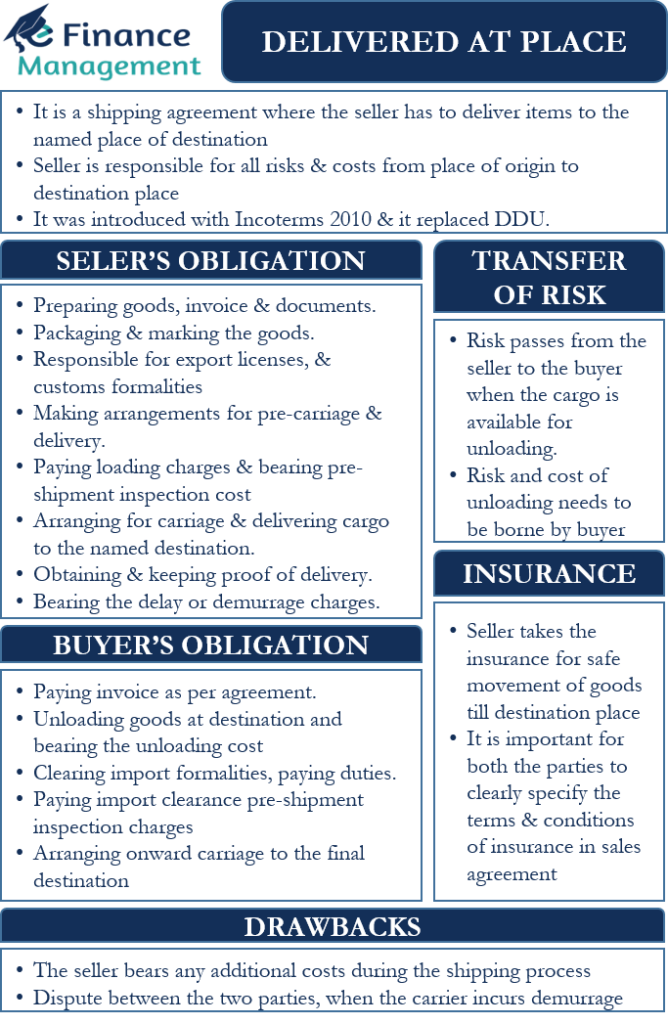Delivered At Place or DAP is one of the Incoterms that assist the parties in the case of international trade. It is a type of shipping agreement where the seller has to deliver the items to the named place of destination. A point to be noted is that the items that the seller delivers must be ready for unloading. Like many other Incoterms, one can use DAP for any mode of transport, or even if the contract includes two or more transport modes.
In simple words, we can say that the seller is responsible for all risks and costs from the place of origin to the named place of destination. Under DAP, the seller needs to arrange for the carriage, as well as deliver the goods at the named place. The goods need to be ready for unloading from the transport mode that the seller uses for delivery. The parties need to clearly specify the unloading spot at the named place of destination. The seller needs to notify the buyer about the arrival of the goods in advance.
This Incoterms was introduced with Incoterms 2010, and at the time, it replaced DDU (Delivery Duty Unpaid). Talking of usage, in the shipping agreement, we use the term DAP along with the location, such as “DAP, Port of Los Angeles.”
Transfer of Risk Under Delivered At Place
Under DAP, the risk passes from the seller to the buyer when the cargo is available (or ready) for unloading. So, this means that the unloading is at the risk of the buyer. And obviously, the cost of the unloading also needs to be borne by the buyer. It is the duty of the buyer to get the import clearance, as well as bear any local taxes or import duties.
If the seller unloads the goods, then they may claim the applicable cost from the buyer. However, payment depends on the buyer’s wish. The seller is responsible for clearing all the necessary export formalities for the consignment.
Delivered At Place – Buyer and Seller Obligations
The seller’s obligations under the DAP are:
- Preparing the goods, invoice, as well as relevant documents.
- Clearly packaging and marking the goods.
- Responsible for export licenses, as well as clearing customs formalities for exports.
- Making arrangements for pre-carriage and delivery.
- Paying the loading charges and bearing the cost of pre-shipment inspection.
- Arranging for the main carriage and delivering the cargo to the named place of destination.
- Obtaining and keeping the proof of delivery.
- Bearing the delay or demurrage charges.
The buyer’s obligations under the DAP are:
- Paying the invoice as per the agreement.
- Unloading the goods at the destination from the arriving means of transportation and bearing the unloading cost.
- Clearing import formalities, as well as paying duties.
- Paying the charges for import clearance pre-shipment inspection.
- Arranging for onward carriage to the final destination.

Delivered At Place – Benefits and Drawbacks
DAP offers more convenience, as well as minimal liability to the buyer than the seller. Thus, it is comparatively more advantageous to the buyer.
One major advantage of DAP is that it clearly states the responsibility of the parties in case of additional expenses during the shipping process. As per this Incoterm, it is the buyer that is responsible for all risks and losses after the delivery of the cargo to him to her. On the other hand, the seller bears any additional costs during the shipping process.
Even though DAP clears the rights and responsibilities of the buyer and seller, there are scenarios that may lead to a dispute between the two parties. One such scenario is when the carrier incurs demurrage. Demurrage is basically the charge for failing to unload the cargo in time. And it results primarily due to not getting proper clearance from either buyer or the seller.
In such a case, the fault is of the party that did not provide the proper and timely clearance. However, at times, it could get difficult to determine whose fault it is because of the laws of different countries. In such an ambiguous situation, usually, the seller has to bear the cost of demurrage.
DAP Insurance
In DAP, none of the parties has an obligation to insure the cargo. However, since the seller bears the most responsibilities and liabilities, the seller usually takes the insurance for the safe movement of goods till the destination. A seller may just cover part of the transportation that they are liable for. Experts, however, recommend that the seller takes the insurance for full transportation, i.e., from start to end. Moreover, it is important for buyers and sellers to clearly specify the terms and conditions of the insurance in the sales agreement to avoid any dispute and thus jeopardize the consignment.
Keep reading – Incoterms.
RELATED POSTS
- Delivered Ex-Ship – Meaning, Example, and Relevance
- Inland Bill of Lading – Meaning, Importance and More
- Free Carrier – Meaning, Obligations, Benefits, Pros and Cons
- FOB Destination – Meaning, Types, Importance And More
- Multimodal Bill of Lading – Meaning, What it Includes, and More
- Through Bill of Lading – Meaning, Benefits and More

